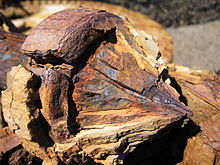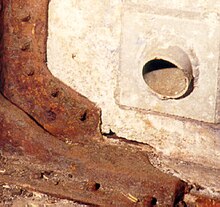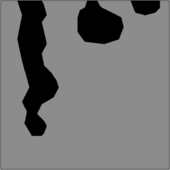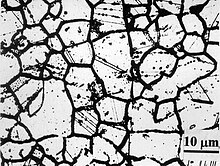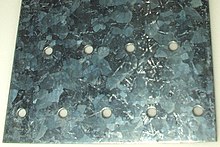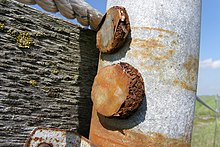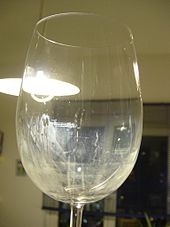From Wikipedia, the free encyclopedia
Rust, the most familiar example of corrosion
Volcanic gases have accelerated the extensive corrosion of this abandoned mining machinery, rendering it almost unrecognizable
Corrosion on exposed metal, including a bolt and nut
Side view Crow Hall Railway Bridge north of Preston Lancs corroding – general
Side view Crow Hall Railway Bridge north of Preston Lancs corroding
Corrosion is a
natural process, which converts a refined metal to a more chemically-stable form, such as its
oxide,
hydroxide, or
sulfide. It is the gradual destruction of materials (usually
metals) by chemical and/or electrochemical reaction with their environment.
Corrosion engineering is the field dedicated to controlling and stopping corrosion.
In the most common use of the word, this means
electrochemical oxidation of metal in reaction with an oxidant such as
oxygen or
sulfates.
Rusting, the formation of
iron oxides, is a well-known example of electrochemical corrosion. This type of damage typically produces
oxide(s) or
salt(s)
of the original metal, and results in a distinctive orange colouration.
Corrosion can also occur in materials other than metals, such as
ceramics or
polymers,
although in this context, the term "degradation" is more common.
Corrosion degrades the useful properties of materials and structures
including strength, appearance and permeability to liquids and gases.
Many structural
alloys
corrode merely from exposure to moisture in air, but the process can be
strongly affected by exposure to certain substances. Corrosion can be
concentrated locally to form a
pit
or crack, or it can extend across a wide area more or less uniformly
corroding the surface. Because corrosion is a diffusion-controlled
process, it occurs on exposed surfaces. As a result, methods to reduce
the activity of the exposed surface, such as
passivation and
chromate conversion, can increase a material's corrosion resistance. However, some corrosion mechanisms are less visible and less predictable.
Galvanic corrosion
Galvanic
corrosion of aluminium. A 5-mm-thick aluminium alloy plate is
physically (and hence, electrically) connected to a 10-mm-thick mild
steel structural support. Galvanic corrosion occurred on the aluminium
plate along the joint with the steel. Perforation of aluminium plate
occurred within 2 years.
Galvanic corrosion occurs when two different metals have physical or
electrical contact with each other and are immersed in a common
electrolyte, or when the same metal is exposed to electrolyte with different concentrations. In a
galvanic couple, the more active metal (the anode) corrodes at an accelerated rate and the more
noble metal
(the cathode) corrodes at a slower rate. When immersed separately, each
metal corrodes at its own rate. What type of metal(s) to use is readily
determined by following the
galvanic series.
For example, zinc is often used as a sacrificial anode for steel
structures. Galvanic corrosion is of major interest to the marine
industry and also anywhere water (containing salts) contacts pipes or
metal structures.
Factors such as relative size of
anode, types of metal, and operating conditions (
temperature,
humidity,
salinity, etc.) affect galvanic corrosion. The surface area ratio of the anode and
cathode directly affects the corrosion rates of the materials. Galvanic corrosion is often prevented by the use of
sacrificial anodes.
Galvanic series
In any given environment (one standard medium is aerated, room-temperature
seawater), one metal will be either more
noble or more
active
than others, based on how strongly its ions are bound to the surface.
Two metals in electrical contact share the same electrons, so that the
"tug-of-war" at each surface is analogous to competition for free
electrons between the two materials. Using the electrolyte as a host for
the flow of ions in the same direction, the noble metal will take
electrons from the active one. The resulting mass flow or electric
current can be measured to establish a hierarchy of materials in the
medium of interest. This hierarchy is called a
galvanic series and is useful in predicting and understanding corrosion.
Corrosion removal
Often it is possible to chemically remove the products of corrosion. For example,
phosphoric acid in the form of
naval jelly is often applied to ferrous tools or surfaces to remove rust. Corrosion removal should not be confused with
electropolishing,
which removes some layers of the underlying metal to make a smooth
surface. For example, phosphoric acid may also be used to electropolish
copper but it does this by removing copper, not the products of copper
corrosion.
Resistance to corrosion
Intrinsic chemistry
Gold nuggets do not naturally corrode, even on a geological time scale.
The materials most resistant to corrosion are those for which corrosion is
thermodynamically unfavorable. Any corrosion products of
gold or
platinum
tend to decompose spontaneously into pure metal, which is why these
elements can be found in metallic form on Earth and have long been
valued. More common "base" metals can only be protected by more
temporary means.
Some metals have naturally slow
reaction kinetics, even though their corrosion is thermodynamically favorable. These include such metals as
zinc,
magnesium, and
cadmium. While corrosion of these metals is continuous and ongoing, it happens at an acceptably slow rate. An extreme example is
graphite, which releases large amounts of energy upon
oxidation, but has such slow kinetics that it is effectively immune to electrochemical corrosion under normal conditions.
Passivation
Passivation refers to the spontaneous formation of an ultrathin film
of corrosion products, known as a passive film, on the metal's surface
that act as a barrier to further oxidation. The chemical composition and
microstructure of a passive film are different from the underlying
metal. Typical passive film thickness on aluminium, stainless steels,
and alloys is within 10 nanometers. The passive film is different from
oxide layers that are formed upon heating and are in the micrometer
thickness range – the passive film recovers if removed or damaged
whereas the oxide layer does not. Passivation in natural environments
such as air, water and soil at moderate
pH is seen in such materials as
aluminium,
stainless steel,
titanium, and
silicon.
Passivation is primarily determined by metallurgical and environmental factors. The effect of pH is summarized using
Pourbaix diagrams,
but many other factors are influential. Some conditions that inhibit
passivation include high pH for aluminium and zinc, low pH or the
presence of
chloride
ions for stainless steel, high temperature for titanium (in which case
the oxide dissolves into the metal, rather than the electrolyte) and
fluoride
ions for silicon. On the other hand, unusual conditions may result in
passivation of materials that are normally unprotected, as the alkaline
environment of
concrete does for
steel rebar. Exposure to a liquid metal such as
mercury or hot
solder can often circumvent passivation mechanisms.
Corrosion in passivated materials
Passivation
is extremely useful in mitigating corrosion damage, however even a
high-quality alloy will corrode if its ability to form a passivating
film is hindered. Proper selection of the right grade of material for
the specific environment is important for the long-lasting performance
of this group of materials. If breakdown occurs in the passive film due
to chemical or mechanical factors, the resulting major modes of
corrosion may include
pitting corrosion,
crevice corrosion, and
stress corrosion cracking.
Pitting corrosion
Diagram showing cross-section of pitting corrosion
Certain conditions, such as low concentrations of oxygen or high concentrations of species such as chloride which complete as
anions,
can interfere with a given alloy's ability to re-form a passivating
film. In the worst case, almost all of the surface will remain
protected, but tiny local fluctuations will degrade the oxide film in a
few critical points. Corrosion at these points will be greatly
amplified, and can cause
corrosion pits of several types, depending upon conditions. While the corrosion pits only
nucleate
under fairly extreme circumstances, they can continue to grow even when
conditions return to normal, since the interior of a pit is naturally
deprived of oxygen and locally the pH decreases to very low values and
the corrosion rate increases due to an autocatalytic process. In extreme
cases, the sharp tips of extremely long and narrow corrosion pits can
cause
stress concentration
to the point that otherwise tough alloys can shatter; a thin film
pierced by an invisibly small hole can hide a thumb sized pit from view.
These problems are especially dangerous because they are difficult to
detect before a part or structure
fails. Pitting remains among the most common and damaging forms of corrosion in passivated alloys, but it can be prevented by control of the alloy's environment.
Pitting results when a small hole, or cavity, forms in the metal,
usually as a result of de-passivation of a small area. This area
becomes anodic, while part of the remaining metal becomes cathodic,
producing a localized galvanic reaction. The deterioration of this small
area penetrates the metal and can lead to failure. This form of
corrosion is often difficult to detect due to the fact that it is
usually relatively small and may be covered and hidden by
corrosion-produced compounds.
Weld decay and knifeline attack
Normal microstructure of Type 304 stainless steel surface
Sensitized metallic microstructure, showing wider intergranular boundaries
Stainless steel can pose special corrosion challenges, since its
passivating behavior relies on the presence of a major alloying
component (
chromium, at least 11.5%). Because of the elevated temperatures of
welding and heat treatment,
chromium carbides can form in the
grain boundaries
of stainless alloys. This chemical reaction robs the material of
chromium in the zone near the grain boundary, making those areas much
less resistant to corrosion. This creates a
galvanic couple
with the well-protected alloy nearby, which leads to "weld decay"
(corrosion of the grain boundaries in the heat affected zones) in highly
corrosive environments. This process can seriously reduce the
mechanical strength of welded joints over time.
A stainless steel is said to be "sensitized" if chromium carbides
are formed in the microstructure. A typical microstructure of a
normalized
type 304 stainless steel
shows no signs of sensitization, while a heavily sensitized steel shows
the presence of grain boundary precipitates. The dark lines in the
sensitized microstructure are networks of chromium carbides formed along
the grain boundaries.
Special alloys, either with low carbon content or with added carbon "
getters" such as titanium and
niobium
(in types 321 and 347, respectively), can prevent this effect, but the
latter require special heat treatment after welding to prevent the
similar phenomenon of "knifeline attack". As its name implies, corrosion
is limited to a very narrow zone adjacent to the weld, often only a few
micrometers across, making it even less noticeable.
Crevice corrosion
Corrosion in the crevice between the tube and tube sheet (both made of type 316 stainless steel) of a heat exchanger in a seawater desalination plant
Crevice corrosion
is a localized form of corrosion occurring in confined spaces
(crevices), to which the access of the working fluid from the
environment is limited. Formation of a differential aeration cell leads
to corrosion inside the crevices. Examples of crevices are gaps and
contact areas between parts, under gaskets or seals, inside cracks and
seams, spaces filled with deposits and under sludge piles.
Crevice corrosion is influenced by the crevice type (metal-metal,
metal-nonmetal), crevice geometry (size, surface finish), and
metallurgical and environmental factors. The susceptibility to crevice
corrosion can be evaluated with ASTM standard procedures. A critical
crevice corrosion temperature is commonly used to rank a material's
resistance to crevice corrosion.
High-temperature corrosion
High-temperature corrosion
is chemical deterioration of a material (typically a metal) as a result
of heating. This non-galvanic form of corrosion can occur when a metal
is subjected to a hot atmosphere containing oxygen, sulfur, or other
compounds capable of oxidizing (or assisting the oxidation of) the
material concerned. For example, materials used in aerospace, power
generation and even in car engines have to resist sustained periods at
high temperature in which they may be exposed to an atmosphere
containing potentially highly corrosive products of combustion.
The products of high-temperature corrosion can potentially be
turned to the advantage of the engineer. The formation of oxides on
stainless steels, for example, can provide a protective layer preventing
further atmospheric attack, allowing for a material to be used for
sustained periods at both room and high temperatures in hostile
conditions. Such high-temperature corrosion products, in the form of
compacted oxide layer glazes, prevent or reduce wear during high-temperature sliding contact of metallic (or metallic and ceramic) surfaces.
Thermal oxidation is also commonly used as a route towards the obtainment of controlled oxide nanostructures, including
nanowires and thin films.
Microbial corrosion
Accelerated low-water corrosion (ALWC) is a particularly
aggressive form of MIC that affects steel piles in seawater near the low
water tide mark. It is characterized by an orange sludge, which smells
of hydrogen sulfide when treated with acid. Corrosion rates can be very
high and design corrosion allowances can soon be exceeded leading to
premature failure of the steel pile.
Piles that have been coated and have cathodic protection installed at
the time of construction are not susceptible to ALWC. For unprotected
piles, sacrificial anodes can be installed locally to the affected areas
to inhibit the corrosion or a complete retrofitted sacrificial anode
system can be installed. Affected areas can also be treated using
cathodic protection, using either sacrificial anodes or applying current
to an inert anode to produce a calcareous deposit, which will help
shield the metal from further attack.
Metal dusting
Metal dusting
is a catastrophic form of corrosion that occurs when susceptible
materials are exposed to environments with high carbon activities, such
as synthesis gas and other high-CO environments. The corrosion manifests
itself as a break-up of bulk metal to metal powder. The suspected
mechanism is firstly the deposition of a graphite layer on the surface
of the metal, usually from
carbon monoxide (CO) in the vapor phase. This graphite layer is then thought to form metastable M
3C species (where M is the metal), which migrate away from the metal surface. However, in some regimes no M
3C species is observed indicating a direct transfer of metal atoms into the graphite layer.
Protection from corrosion
The US military shrink wraps equipment such as helicopters to protect them from corrosion and thus save millions of dollars
Various treatments are used to slow corrosion damage to metallic
objects which are exposed to the weather, salt water, acids, or other
hostile environments. Some unprotected metallic alloys are extremely
vulnerable to corrosion, such as those used in
neodymium magnets, which can
spall or crumble into powder even in dry, temperature-stable indoor environments unless properly treated to discourage corrosion.
Surface treatments
When
surface treatments are used to retard corrosion, great care must be
taken to ensure complete coverage, without gaps, cracks, or pinhole
defects. Small defects can act as an "
Achilles' heel",
allowing corrosion to penetrate the interior and causing extensive
damage even while the outer protective layer remains apparently intact
for a period of time.
Applied coatings
Plating,
painting, and the application of
enamel are the most common
anti-corrosion
treatments. They work by providing a barrier of corrosion-resistant
material between the damaging environment and the structural material.
Aside from cosmetic and manufacturing issues, there may be tradeoffs in
mechanical flexibility versus resistance to abrasion and high
temperature. Platings usually fail only in small sections, but if the
plating is more noble than the substrate (for example, chromium on
steel), a
galvanic couple
will cause any exposed area to corrode much more rapidly than an
unplated surface would. For this reason, it is often wise to plate with
active metal such as
zinc or
cadmium.
If the zinc coating is not thick enough the surface soon becomes
unsightly with rusting obvious. The design life is directly related to
the metal coating thickness.
Corroding Steel Electrification Gantry
Painting either by roller or brush is more desirable for tight
spaces; spray would be better for larger coating areas such as steel
decks and waterfront applications. Flexible
polyurethane
coatings, like Durabak-M26 for example, can provide an anti-corrosive
seal with a highly durable slip resistant membrane. Painted coatings are
relatively easy to apply and have fast drying times although
temperature and humidity may cause dry times to vary.
Reactive coatings
If the environment is controlled (especially in recirculating systems),
corrosion inhibitors
can often be added to it. These chemicals form an electrically
insulating or chemically impermeable coating on exposed metal surfaces,
to suppress electrochemical reactions. Such methods make the system less
sensitive to scratches or defects in the coating, since extra
inhibitors can be made available wherever metal becomes exposed.
Chemicals that inhibit corrosion include some of the salts in
hard water (Roman water systems are famous for their
mineral deposits),
chromates,
phosphates,
polyaniline, other
conducting polymers and a wide range of specially-designed chemicals that resemble
surfactants (i.e. long-chain organic molecules with ionic end groups).
Anodization
Aluminium alloys
often undergo a surface treatment. Electrochemical conditions in the
bath are carefully adjusted so that uniform pores, several
nanometers
wide, appear in the metal's oxide film. These pores allow the oxide to
grow much thicker than passivating conditions would allow. At the end of
the treatment, the pores are allowed to seal, forming a
harder-than-usual surface layer. If this coating is scratched, normal
passivation processes take over to protect the damaged area.
Anodizing is very resilient to weathering and corrosion, so it is
commonly used for building facades and other areas where the surface
will come into regular contact with the elements. While being resilient,
it must be cleaned frequently. If left without cleaning,
panel edge staining
will naturally occur. Anodization is the process of converting an anode
into cathode by bringing a more active anode in contact with it.
Biofilm coatings
A
new form of protection has been developed by applying certain species
of bacterial films to the surface of metals in highly corrosive
environments. This process increases the corrosion resistance
substantially. Alternatively, antimicrobial-producing
biofilms can be used to inhibit mild steel corrosion from
sulfate-reducing bacteria.
Controlled permeability formwork
Controlled permeability formwork (CPF) is a method of preventing the corrosion of
reinforcement by naturally enhancing the durability of the
cover during concrete placement. CPF has been used in environments to combat the effects of
carbonation, chlorides,
frost and abrasion.
Cathodic protection
Cathodic protection (CP) is a technique to control the corrosion of a metal surface by making that surface the cathode of an
electrochemical cell. Cathodic protection systems are most commonly used to protect steel
pipelines and tanks; steel pier
piles, ships, and offshore
oil platforms.
Sacrificial anode protection
Sacrificial anode attached to the hull of a ship
For effective CP, the potential of the steel surface is polarized
(pushed) more negative until the metal surface has a uniform potential.
With a uniform potential, the driving force for the corrosion reaction
is halted. For galvanic CP systems, the anode material corrodes under
the influence of the steel, and eventually it must be replaced. The
polarization is caused by the current flow from the anode to the cathode, driven by the difference in
electrode potential
between the anode and the cathode. The most common sacrificial anode
materials are aluminum, zinc, magnesium and related alloys. Aluminum has
the highest capacity, and magnesium has the highest driving voltage and
is thus used where resistance is higher. Zinc is general purpose and
the basis for galvanizing.
Impressed current cathodic protection
For larger structures, galvanic anodes cannot economically deliver enough current to provide complete protection.
Impressed current cathodic protection (ICCP) systems use anodes connected to a
DC power source (such as a
cathodic protection rectifier). Anodes for ICCP systems are tubular and solid rod shapes of various specialized materials. These include high silicon
cast iron, graphite, mixed metal oxide or platinum coated titanium or niobium coated rod and wires.
Anodic protection
Anodic protection impresses anodic current on the structure to be
protected (opposite to the cathodic protection). It is appropriate for
metals that exhibit passivity (e.g. stainless steel) and suitably small
passive current over a wide range of potentials. It is used in
aggressive environments, such as solutions of sulfuric acid.
Rate of corrosion
These neodymium magnets corroded extremely rapidly after only 5 months of outside exposure
The formation of an oxide layer is described by the
Deal Grove model,
which is used to predict and control oxide layer formation in diverse
situations. A simple test for measuring corrosion is the weight loss
method.
The method involves exposing a clean weighed piece of the metal or
alloy to the corrosive environment for a specified time followed by
cleaning to remove corrosion products and weighing the piece to
determine the loss of weight. The rate of corrosion (R) is calculated as

where k is a constant,
W is the weight loss of the metal in time t, A is the surface area of the metal exposed, and ρ is the density of the metal (in g/cm³).
Other common expressions for the corrosion rate is penetration depth and change of mechanical properties.
Economic impact
The collapsed Silver Bridge, as seen from the Ohio side
In 2002, the US
Federal Highway Administration
released a study titled "Corrosion Costs and Preventive Strategies in
the United States" on the direct costs associated with metallic
corrosion in the US industry. In 1998, the total annual direct cost of
corrosion in the U.S. was ca. $276 billion (ca. 3.2% of the US
gross domestic product).
Broken down into five specific industries, the economic losses are
$22.6 billion in infrastructure; $17.6 billion in production and
manufacturing; $29.7 billion in transportation; $20.1 billion in
government; and $47.9 billion in utilities.
Rust is one of the most common causes of bridge accidents. As
rust has a much higher volume than the originating mass of iron, its
build-up can also cause failure by forcing apart adjacent parts. It was
the cause of the collapse of the
Mianus river bridge
in 1983, when the bearings rusted internally and pushed one corner of
the road slab off its support. Three drivers on the roadway at the time
died as the slab fell into the river below. The following
NTSB
investigation showed that a drain in the road had been blocked for road
re-surfacing, and had not been unblocked; as a result, runoff water
penetrated the support hangers. Rust was also an important factor in the
Silver Bridge disaster of 1967 in
West Virginia, when a steel
suspension bridge collapsed within a minute, killing 46 drivers and passengers on the bridge at the time.
Similarly, corrosion of concrete-covered steel and iron can cause the concrete to
spall, creating severe structural problems. It is one of the most common failure modes of
reinforced concrete bridges.
Measuring instruments based on the half-cell potential can detect the
potential corrosion spots before total failure of the concrete structure
is reached.
Until 20–30 years ago, galvanized steel pipe was used extensively
in the potable water systems for single and multi-family residents as
well as commercial and public construction. Today, these systems have
long ago consumed the protective zinc and are corroding internally
resulting in poor water quality and pipe failures.
The economic impact on homeowners, condo dwellers, and the public
infrastructure is estimated at 22 billion dollars as the insurance
industry braces for a wave of claims due to pipe failures.
Corrosion in nonmetals
Most
ceramic materials are almost entirely immune to corrosion. The strong
chemical bonds
that hold them together leave very little free chemical energy in the
structure; they can be thought of as already corroded. When corrosion
does occur, it is almost always a simple dissolution of the material or
chemical reaction, rather than an electrochemical process. A common
example of corrosion protection in ceramics is the
lime added to soda-lime
glass to reduce its solubility in water; though it is not nearly as soluble as pure
sodium silicate, normal glass does form sub-microscopic flaws when exposed to moisture. Due to its
brittleness, such flaws cause a dramatic reduction in the strength of a glass object during its first few hours at room temperature.
Corrosion of polymers
Polymer degradation
involves several complex and often poorly understood physiochemical
processes. These are strikingly different from the other processes
discussed here, and so the term "corrosion" is only applied to them in a
loose sense of the word. Because of their large molecular weight, very
little
entropy
can be gained by mixing a given mass of polymer with another substance,
making them generally quite difficult to dissolve. While dissolution is
a problem in some polymer applications, it is relatively simple to
design against.
A more common and related problem is "swelling", where small
molecules infiltrate the structure, reducing strength and stiffness and
causing a volume change. Conversely, many polymers (notably flexible
vinyl) are intentionally swelled with
plasticizers, which can be leached out of the structure, causing brittleness or other undesirable changes.
Corrosion of glass
Glass is characterized by a high degree of corrosion-resistance.
Because of its high water-resistance it is often used as primary
packaging material in the pharma industry since most medicines are
preserved in a watery solution. Besides its water-resistance, glass is also robust when exposed to certain chemically aggressive liquids or gases.
Glass disease is the corrosion of silicate glasses in
aqueous solutions. It is governed by two mechanisms:
diffusion-
controlled leaching (ion exchange) and hydrolytic dissolution of the glass network. Both mechanisms strongly depend on the pH of contacting solution: the rate of ion exchange decreases with pH as 10
−0.5pH whereas the rate of hydrolytic dissolution increases with pH as 10
0.5pH.
Mathematically, corrosion rates of glasses are characterized by normalized corrosion rates of elements NRi (g/cm2·d) which are determined as the ratio of total amount of released species into the water Mi (g) to the water-contacting surface area S (cm2), time of contact t (days) and weight fraction content of the element in the glass fi:
 .
.
The overall corrosion rate is a sum of contributions from both mechanisms (leaching + dissolution) NRi=NRxi+NRh.
Diffusion-controlled leaching (ion exchange) is characteristic of the
initial phase of corrosion and involves replacement of alkali ions in
the glass by a hydronium (H3O+) ion from the
solution. It causes an ion-selective depletion of near surface layers of
glasses and gives an inverse square root dependence of corrosion rate
with exposure time. The diffusion-controlled normalized leaching rate of
cations from glasses (g/cm2·d) is given by:
 ,
,
where t is time, Di is the i-th cation effective diffusion coefficient (cm2/d), which depends on pH of contacting water as Di = Di0·10–pH, and ρ is the density of the glass (g/cm3).
Glass network dissolution is characteristic of the later phases
of corrosion and causes a congruent release of ions into the water
solution at a time-independent rate in dilute solutions (g/cm2·d):
 ,
,
where r
h is the stationary
hydrolysis (dissolution) rate of the glass (cm/d).
In closed systems the consumption of protons from the aqueous phase increases the pH and causes a fast transition to hydrolysis.
However, a further saturation of solution with silica impedes
hydrolysis and causes the glass to return to an ion-exchange, e.g.
diffusion-controlled regime of corrosion.
In typical natural conditions normalized corrosion rates of silicate glasses are very low and are of the order of 10−7–10−5 g/(cm2·d). The very high durability of silicate glasses in water makes them suitable for hazardous and nuclear waste immobilisation.
Glass corrosion tests
Effect
of addition of a certain glass component on the chemical durability
against water corrosion of a specific base glass (corrosion test ISO
719).
There exist numerous standardized procedures for measuring the corrosion (also called chemical durability)
of glasses in neutral, basic, and acidic environments, under simulated
environmental conditions, in simulated body fluid, at high temperature
and pressure, and under other conditions.
The standard procedure ISO 719
describes a test of the extraction of water-soluble basic compounds
under neutral conditions: 2 g of glass, particle size 300–500 μm, is
kept for 60 min in 50 ml de-ionized water of grade 2 at 98 °C; 25 ml of
the obtained solution is titrated against 0.01 mol/l
HCl solution.
The standardized test ISO 719 is not suitable for glasses with poor
or not extractable alkaline components, but which are still attacked by
water, e.g. quartz glass, B2O3 glass or P2O5 glass.
Usual glasses are differentiated into the following classes:
Hydrolytic class 1 (Type I):
Glass of this class contains essential quantities of
boron oxides,
aluminium oxides and
alkaline earth oxides.
Through its composition neutral glass has a high resistance against
temperature shocks and the highest hydrolytic resistance. Against acid
and neutral solutions it shows high chemical resistance, because of its
poor alkali content against alkaline solutions.
Hydrolytic class 2 (Type II):
This class usually contains sodium silicate glasses with a high
hydrolytic resistance through surface finishing. Sodium silicate glass
is a silicate glass, which contains alkali- and
alkaline earth oxide and primarily
sodium oxide and
Calcium oxide.
Hydrolytic class 3 (Type III):
Glass of the 3rd hydrolytic class usually contains sodium
silicate glasses and has a mean hydrolytic resistance, which is two
times poorer than of type 1 glasses.
Acid class DIN 12116 and alkali class DIN 52322 (ISO 695) are to be distinguished from the hydrolytic class DIN 12111 (ISO 719).




![{\displaystyle aA+bB+n[e^{-}]+h[{\ce {H+}}]=cC+dD}](https://wikimedia.org/api/rest_v1/media/math/render/svg/8eca87edfb6d0e6b8d746920061d325a4679dc8e)




